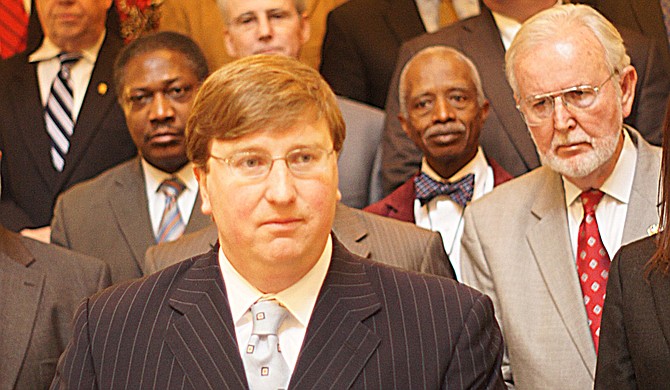Lt. Gov. Tate Reeves and other Republican leaders are pushing to place an initiative on this year's ballot that would put a limit of two consecutive four-year terms on each of the 174 state legislative seats and the eight statewide elected offices. Photo by R.L. Nave.
JACKSON, Miss. (AP) — A conservative group announced last week that it will try to put a term-limits amendment on the Mississippi ballot, but history shows there's a good chance the proposal will never even come up for a vote.
Legislators made Mississippi's initiative process burdensome when they created it more than two decades ago. Putting a proposed constitutional amendment on the ballot requires people to circulate petitions and gather signatures from at least 107,216 registered voters within a year. At least 21,443 of those must come from each of the five congressional districts that the state used in 2000. Mississippi has had four congressional districts since the 2002 election cycle, but the initiative law still relies on outdated maps.
Most people who have started petition drives have fallen short in getting signatures. Persuading perfect strangers to sign a piece of paper in a parking lot or at a high-school football game is not as easy as it seems.
The new proposal, which United Conservatives Fund created, would put a limit of two consecutive four-year terms on each of the 174 state legislative seats and the eight statewide elected offices, from governor to insurance commissioner. The fund is a political action committee headed by Republican state Sen. Chris McDaniel of Ellisville, who's currently seeking his third consecutive term in office.
Only the governor and lieutenant governor currently have term limits. Mississippi voters defeated term-limits initiatives in 1995 and 1999, and in both elections, the politically connected Farm Bureau spent significant amounts of money against the proposals. A later term-limits initiative never made it to the ballot because organizers didn't get enough signatures.
The secretary of state's website lists the initiatives that have been started since the 1990s.
Three initiatives appeared on the ballot in 2011, with voters approving two and rejecting one. Initiative 26, which failed, was a "personhood" amendment that abortion opponents pushed. It would have defined human life as beginning at "the moment of fertilization, cloning or the functional equivalent thereof." High-profile Republicans supported it, including Phil Bryant, who was elected governor on the same ballot. But it drew the ire of people who saw it as a threat to reproductive health, including fertility treatments.
The two measures that passed in 2011 were Initiative 27, which requires voters to show photo identification at the polls; and Initiative 31, which limits the government's ability to use eminent domain to take private land for economic development projects.
Among the proposals that never got to the ballot because organizers didn't collect enough signatures were initiatives 5 and 8, which would have allowed denturists—who are not dentists—to fit and make dentures. They would have amended the state constitution with language that sounds like a low-budget TV ad: "a 90-day, 100 percent money-back warranty on dentures furnished by denturists."
Also falling short of signatures were initiatives 12, 13 and 20, which proposed making gambling illegal, years after casinos had started boosting the economy along the Mississippi River and the Gulf Coast. All three were declared unconstitutional in Hinds County circuit court.
Another that never got to the ballot was Initiative 37, which would have revived Colonel Reb as the University of Mississippi mascot. Administrators sidelined the colonel several years ago amid criticism that the bearded old man was too reminiscent of a plantation master. Arthur Randallson of Southaven, who sponsored the Colonel Reb initiative, launched a similar but more broadly written "Mississippi Heritage" proposal, Initiative 46, in late 2014 and still has several months to gather signatures. It would change the state song to "Dixie" and designate April as Confederate Heritage Month.
Copyright Associated Press. All rights reserved. This material may not be published, broadcast, rewritten, or redistributed.


